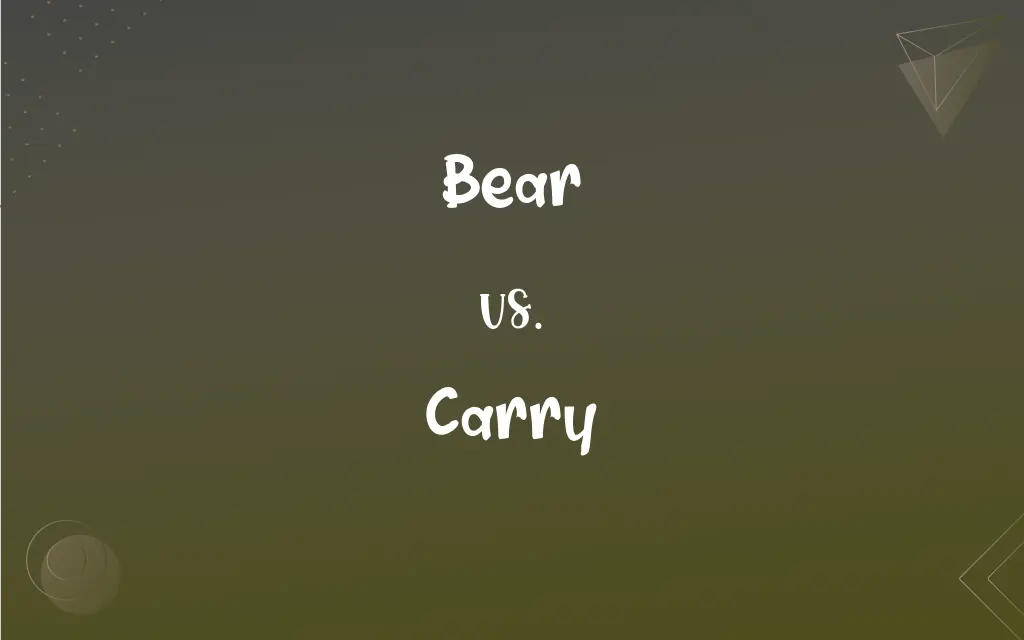Bear vs. Carry: What's the Difference?
Edited by Janet White || By Harlon Moss || Updated on November 29, 2023
"Bear" often refers to enduring or holding up under strain, while "carry" typically means to physically transport or support something from one place to another.

Key Differences
"Bear" is often used metaphorically to denote enduring or tolerating, as in "bearing the pain." On the other hand, "carry" implies physically holding and moving something, like "carrying a box."
"Bear" can have a more emotional or abstract connotation, such as bearing a burden, which may not be physical. "Carry," in contrast, generally refers to a physical action, involving tangible items.
"Bear" can also mean to produce or give birth to, as in "a tree bearing fruit." "Carry," however, is more straightforward, emphasizing the act of transporting or supporting something.
In grammar, "bear" can be both a regular and irregular verb ("bear/bore/borne"), indicating endurance or production. "Carry" is a regular verb, focused on the act of transporting.
Both words have figurative uses, but "bear" often extends to emotional or psychological contexts, like bearing a grudge. "Carry" can denote responsibility or continuation, as in carrying a tradition forward.
ADVERTISEMENT
Comparison Chart
Literal Meaning
To support weight, endure, produce
To transport or hold something
Figurative Use
Emotional or psychological endurance
Responsibility or continuation
Grammatical Form
Regular and irregular verb
Regular verb
Physical vs Abstract
Both physical and abstract connotations
Primarily physical action
Common Phrasal Usage
Bearing witness, bearing fruit
Carrying on, carrying out instructions
ADVERTISEMENT
Bear and Carry Definitions
Bear
To Endure.
She bore the pain silently.
Carry
To Support and Move.
The bridge carries heavy traffic daily.
Bear
To Hold Up Under Strain.
He bore the responsibility well.
Carry
To Convey or Communicate.
His voice carried across the room.
Bear
To Produce or Give Birth.
The tree bears apples every autumn.
Carry
To Hold or Contain.
The pipe carries water to the house.
Bear
To Support Weight.
The table can bear the weight of this sculpture.
Carry
To Transport.
He can carry the boxes upstairs.
Bear
To Carry Oneself.
She bears herself with dignity.
Carry
To Maintain or Continue.
They carry on the family tradition.
Bear
To carry (something) on one's person from one place to another
Bore the suitcase to the station.
Carry
To hold or support while moving; bear
Carried the baby in my arms.
Carrying a heavy backpack.
FAQs
Does "carry" have a metaphorical use?
Yes, like in "carrying out duties."
Can "carry" imply continuation?
Yes, as in "carry on a legacy."
Can "bear" mean to tolerate?
Yes, as in bearing discomfort.
Is "carry" always a physical action?
Mostly, "carry" implies a physical action, like carrying a bag.
Is "carry" used in expressions?
Yes, like "carry the torch."
Can "bear" mean to produce something?
Yes, "bear" can mean to produce, like a tree bearing fruit.
Can "bear" be used in a legal context?
Yes, as in "bearing witness" in a courtroom.
Does "bear" have a nautical use?
Yes, like a ship bearing north.
Can "carry" be used in a musical context?
Yes, like a tune carrying across a room.
Is "bear" ever used in a physical sense?
Yes, like a beam bearing weight.
Is "bear" used in emotional contexts?
Yes, like bearing a grudge.
Does "carry" involve responsibility?
It can, like carrying a responsibility.
Does "carry" imply motion?
Generally, it implies moving something.
Can "bear" be used in cooking?
Not commonly, it's more metaphorical.
Is "carry" a technical term?
Sometimes, like in engineering.
Does "bear" have an agricultural use?
Yes, like crops bearing fruit.
Is "bear" used in financial contexts?
Yes, like bearing the cost.
Can "carry" be used in a sports context?
Yes, like carrying the ball in football.
Can "carry" mean to support emotionally?
Rarely, it's more physical.
Is "bear" a versatile word?
Yes, with various meanings and uses.
About Author
Written by
Harlon MossHarlon is a seasoned quality moderator and accomplished content writer for Difference Wiki. An alumnus of the prestigious University of California, he earned his degree in Computer Science. Leveraging his academic background, Harlon brings a meticulous and informed perspective to his work, ensuring content accuracy and excellence.
Edited by
Janet WhiteJanet White has been an esteemed writer and blogger for Difference Wiki. Holding a Master's degree in Science and Medical Journalism from the prestigious Boston University, she has consistently demonstrated her expertise and passion for her field. When she's not immersed in her work, Janet relishes her time exercising, delving into a good book, and cherishing moments with friends and family.































































